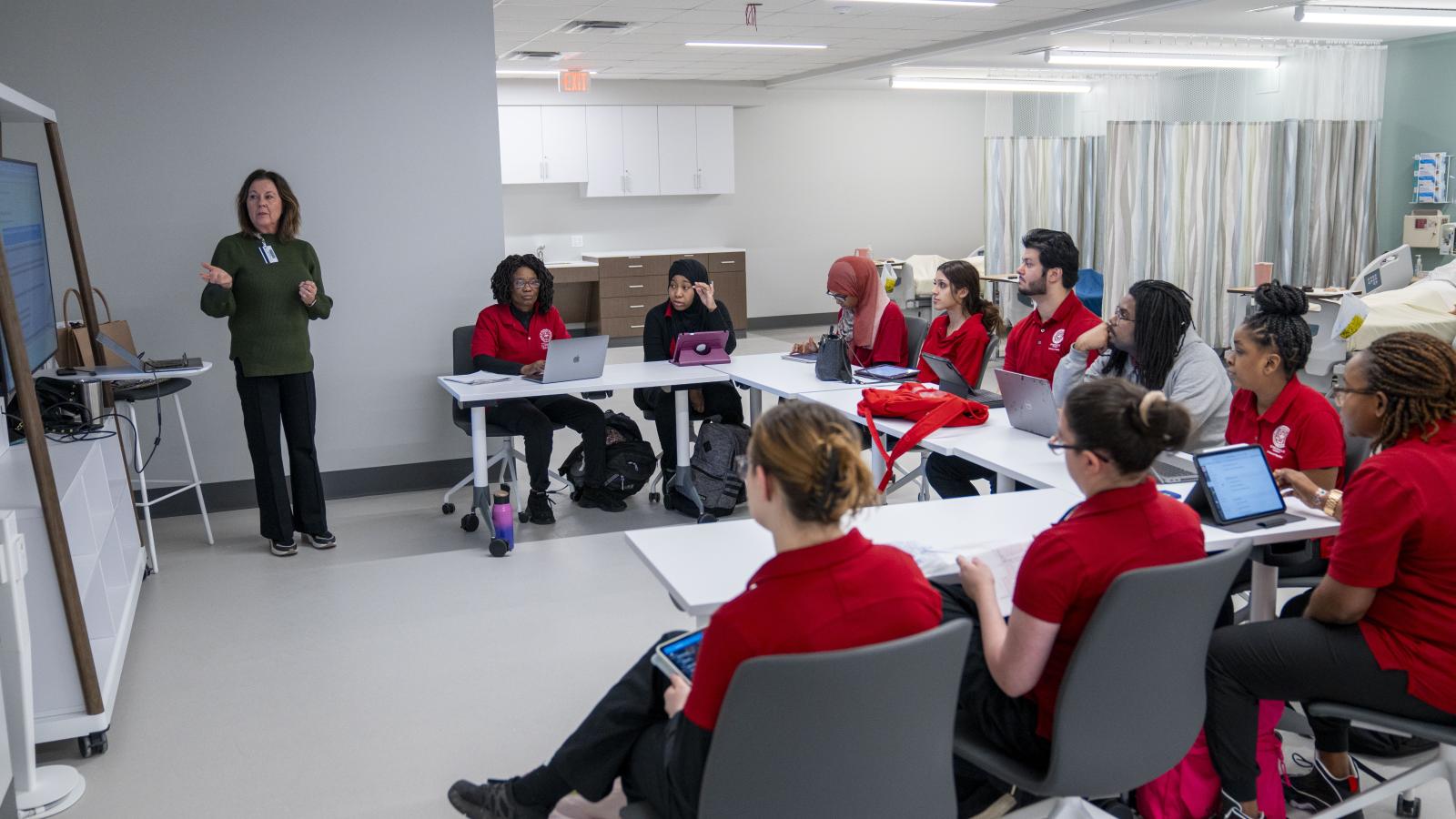
Nursing Education with a Clinical Focus (MS)
- School of Nursing
- Nursing
- 30-45 Credits - 1-3 Years
- Online or In-Person

Transform Care Through Education
Elevate your skills and transform your passion for helping others into a meaningful career in nursing education. D’Youville University’s Master of Science in Nursing Education program provides the advanced knowledge, leadership development, and teaching preparation needed to shape the next generation of nurses.
This flexible program prepares graduates to work in a variety of professional settings — including colleges and universities, hospitals and healthcare systems, community organizations, and professional development programs. Graduates emerge ready to teach, mentor, and lead within academic and clinical learning environments, fostering excellence and compassion in future nursing professionals
Job Titles to Explore
| Employment Settings to Explore
|
Program at a Glance
- In Person OR Online
- 1-3 Years
- 30-45 Credits
- 2 Specializations Available
- 9 Transfer Credits Permittted
- $129,480Median Wage for Nurse Practitioners in 2023
- 45%National Job Growth Projected by 2033
- 30-45Credits
- FlexibleBoth In Person and Online Degrees Available
Welcome to the Garman School of Nursing!
Program Spotlight
The Nursing Education program empowers nurses to become effective educators and mentors. By combining evidence-based theory, research, and hands-on teaching practice, graduates are prepared to lead with excellence in academic and professional healthcare settings.
- Industry Relevance: Training for current and future needs of the job market
- Strong Mentorship & Supervision: Close guidance and support from faculty.
- Holistic Perspective: Develop high-demand credentials in various settings.
- Social Connectedness: Grow as a professional with your peers cohort
Specializations
- Leadership - Emphasis on working in management focused on quality leadership.
- Education - Emphasis on educational pedagogy and clinical preparation.

Want More Flexibility? Enroll in an Online Degree
Program Requirements
A summary of required courses by program specialization and modality:
Nursing Management and Quality Leadership
Nursing Education with a Clinical Focus
Interprofessional Education
Nursing students at D'Youville University learn to work as part of a collaborative healthcare team through simulation, interprofessional education, and clinical experiences both on campus and in the community.
Careers In Nursing
Careers in Nursing
The shortage of physicians and nurses in the United States and around the world is very well recognized. As the demographics of countries are increasing shifting towards more aging populations, societies are experiencing a rise in chronic conditions, placing stronger demands on the healthcare sector. These conditions are what is driving the strong demand for more high-quality professionals in the workforce.
Nursing Management
Nurse managers are the leaders of nursing teams and play pivotal roles in supporting, recruiting, and managing nursing employees. Since nurse managers have experience as practicing nurses, they are uniquely qualified to understand the demands of a primary care environment and balance administrative and staff decisions while ensuring patients receive superior care. Graduates in the management field often work as managers, administrators, and directors in a wide range of healthcare settings, from hospitals to nursing homes.
Nursing Educator
Nurse educators are leaders in academic and clinical settings. They also often provide valuable education to the public and community groups in all areas of the healthcare. The high demand for nurse educators provides ample flexibility to work in all parts of the world, and in a wide array, or combination, of healthcare positions. Nurse educators perform a wide range of roles, including but not limited to working as nursing faculty, developing community health programs for non-profits, consulting with healthcare or pharmaceutical companies, and overseeing staff development in healthcare teams.
Program Objectives
Management-
As a graduate of the program, you will be qualified to
- Financial skills to target healthcare issues from managing your healthcare team to completing budgets and performing audits
- How to analyze information to solve organizational problems and ensure you are delivering quality care through cost-effective method
- You'll complete 180 hours of hands-on fieldwork under the supervision of a qualified preceptor and faculty to apply what you've learned in the classroom to the real world
Education-
As a graduate of this program, you will be qualified to implement education programs in hospitals, educate a new generation of healthcare students in academic settings, or lead the continuing development of a healthcare staff. You will learn to:
- Skills needed to teach students to think critically and communicate accurately while helping them foster a desire for life-long learning
- How to develop educational programs for patients, groups, communities, industries, insurance providers, and government agencies
- To better collaborate across healthcare disciplines and work with information systems to assure your patients and their families have access to information and can easily understand it
Simulation & Clinicals
Additional information is coming soon!
Affiliated Training Sites
Additional information is coming soon!
Accreditation
D'Youville University’s Patricia H. Garman School of Nursing is accredited by the Commission on Collegiate Nursing Education (CCNE). Possessing CCNE-accreditation is a sign to employers that you have received instruction under rigorous standards. Graduates of this program will be prepared to succeed in their respective certification examination and further demonstrate their knowledge and experience to their future employers.
Licensures & Certifications
Management
Graduates of this program will be prepared to take the NLN Nurse Educator Certification Exam to further demonstrate their knowledge and experience to employers.
Relevant Skills and Purposeful Degrees
Additional Program Information
Prerequisite Courses
Prerequisite Courses
Applicants to the Nurse Practitioner (MS) program must complete the following undergraduate course prerequisites:
- Statistics
- Health Assessment (or equivalent)
- Pathophysiology (or equivalent)
- Pharmacology (or equivalent)
Use the Online Course Equivalency database to see whether the courses you've taken at other institutions can be counted towards a degree at D'Youville.
Enrollment Requirements
Enrollment Requirements
- Complete the free online graduate application
- Baccalaureate degree completion in nursing from CCNE or NLNAC (ACEN) accredited program in the US, or by the CNO in Ontario.
- Satisfactory proficiency of degree prerequisites courses or equivalents.
- One year of nursing practice with active unencumbered licensure as a registered nurse.
- Current CPR certification with psychomotor component.
Additional Information
Additional Information
- Preferential admission awarded to students with undergraduate GPA of 3.0 or higher (on a 4.0 scale).
- Proof of official transcripts are not required for admission but must be verified before students can begin classes. Non-U.S. students must submit ‘course-by-course- evaluation (or equivalent) of all transcripts through the World Education Services (WES) or other approved foreign transcript evaluation agencies.
- Canadian RN students must submit both their original Certificate of Registration (issued upon passing initial examination) and a copy of their Annual Registration Renewal (showing current unencumbered license).
Transferability
Students may transfer up to nine (9) graduate credits with grades of B or better into their program at the discretion of the program director. Credits must be earned from an accredited institution in courses required by the program being pursued.
Application Deadline
Additional information is coming soon!
Tuition & Fees
D’Youville University summarizes all tuition and fee information in one location to ensure accuracy and keep things simple for you. The Nurse Practitioner degree costs are aligned with our standard Master’s Degree costs for on campus/hybrid programs. Click here to be re-routed to our Tuition and Fees Page.
Info for Canadian Border Commuters
Canadian applicants interested in commuting to D’Youville University should review the information listed regarding Canadian border commuters on the F-1 Status Page.
FAQs
What is a Nurse Practitioner, and what do they do?
Nurse Practitioners (NPs) are advanced practice registered nurses who provide primary, acute, and specialty healthcare. They diagnose illnesses, prescribe medications, manage treatment plans, and focus on patient education and preventive care.
How is a Nurse Practitioner different from a Registered Nurse?
While Registered Nurses (RNs) focus on direct patient care, NPs have advanced training that allows them to diagnose conditions, prescribe treatments, and function as primary care providers in many states, including New York.
What specialties are offered in the Nurse Practitioner program?
Our program offers specializations in areas like Family Practice, Psychiatric Mental Health, Management, and Education, depending on your career goals.
Do Nurse Practitioners earn more than Registered Nurses?
Yes, the median pay in 2023 for NPs in New York was around $130,000, compared to $86,000 for RNs. (source: U.S. Bureau of Labor Statistics: Occupational Outlook Handbook)
Do I need to have a Bachelor of Science in Nursing (BSN) to apply?
Yes, a BSN is typically required.
What is the application deadline for the program?
Applications are accepted on a rolling basis. Typically, larger cohorts start in the Fall semester. However, we will start a new cohort whenever there are enough interested and qualified students to fill a cohort.
Are continuing education opportunities available for alumni?
Yes, alumni of this program can further distinguish themselves with the NP+MBA combined program or doctorate of nurse practitioner (DNP). D’Youville University also offers a variety of certificate programs to compliment the degree.
Efficiency Statement
We respect your time, and that of others. In alignment with this, we don’t ask for unnecessary paperwork (that you or someone else needs to generate). As standard practice across all degree programs, D’Youville University is a test-optional institution, which doesn’t require SAT/ACT, or graduate entrance exams. We won’t ask you for letters of recommendation, and official transcripts aren’t necessary to be admitted. Just focus on your life transition and provide verification of your official transcripts sometime after you choose DYU is right for you, but before your first day of classes.
Contact Admissions

